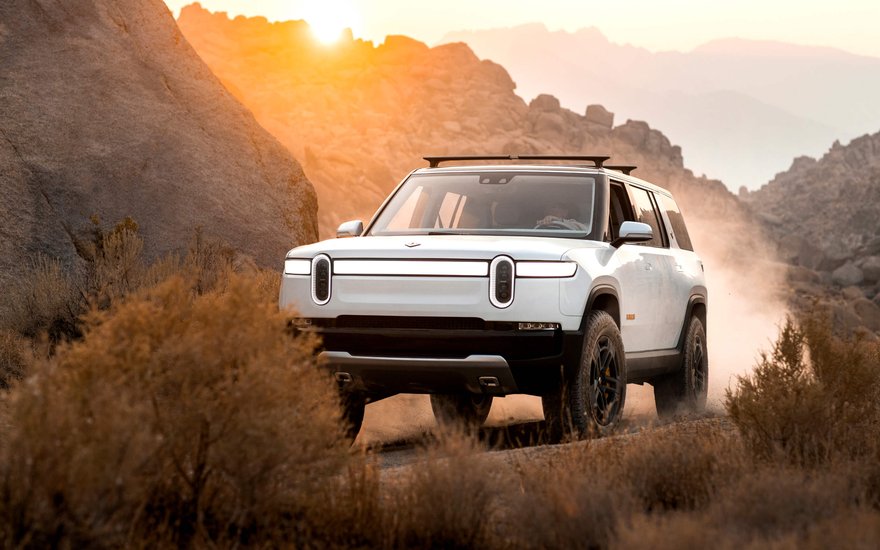The automotive industry is going electric. Every major automaker is actively developing or already selling electric vehicles (EVs). Tesla (NASDAQ:TSLA) is the industry pioneer. Now Ford (NYSE:F), General Motors (NYSE:GM), Volkswagen (OTC:VWAGY), Daimler (OTC:DMLR.Y), and other carmakers are pushing ahead with plans to capitalize on the growing consumer preference for electric cars.

GM plans to sell 400,000 EVs by 2023, while Ford expects 50% of its sales to be from EVs by the end of the decade. Volkswagen's plan is even more ambitious. It is targeting 70% of EV sales in Europe and 55% of sales in the U.S. by 2030. And, despite disruption from Russia's war in Ukraine, Mercedes-Benz maker Daimler will continue its 40 billion euro investment in electric vehicles over the next decade. The company's plans for all of its new vehicle platforms to be purely electric by 2025.
Investing directly in electric vehicle stocks is one way to profit from this mass transition. Another is investing in the companies that supply the batteries, which are the most important and costly components of electric vehicles. If electric vehicle production significantly increases over the next decade, the demand for EV batteries will similarly skyrocket.
Companies that are already major battery producers are heavily investing to meet rising EV battery demand. Meanwhile, battery technology start-ups (some of which are going public via SPAC mergers) are developing new types of energy storage systems that could revolutionize the industry. It's an exciting time to consider investing in EV battery stocks.
Best electric vehicle battery stocks
These are the top EV battery stocks for investors to consider:
| Company | Market Capitalization | Description |
|---|---|---|
| BYD (OTC:BYDD.F) | $84 billion | A vertically integrated manufacturer of EVs and components, including batteries. |
| Albemarle (NYSE:ALB) | $25 billion | A top producer of battery-grade lithium. |
| Panasonic (OTC:PCRFY) | $20 billion | A Japanese conglomerate and battery supplier to Tesla. |
| QuantumScape (NYSE:QS) | $4.6 billion | An early-stage company that develops solid-state battery technology. |
| Microvast (NASDAQ:MVST) | $986 million | A designer, developer, and manufacturer of lithium-ion battery solutions. |
| FREYR (NYSE:FREY) | $788 million | Another early-stage development company building battery factories. |
| Romeo Power (NYSE:RMO) | $145 million | A maker of battery packs for commercial electric trucks. |
1. BYD
BYD is an integrated EV company based in China and one of the world's most valuable automakers. It manufactures and sells hybrid and battery-powered cars, buses, trucks, and monorails. In addition, it builds the batteries, semiconductors, and other components used in its EVs.
One factor that makes BYD stand out in the EV industry is that Warren Buffett is a major shareholder. His Berkshire Hathaway (NYSE:BRK.A)(NYSE:BRK.B) first bought shares of the battery and EV company in 2008. As of May 2022, Buffett's company held a 7.7% stake in BYD worth more than $6.5 billion.
BYD's EVs are top sellers in China. The company sells five of the top 15 new energy vehicles in the country, where it ranks as the leading overall brand. In March 2022, BYD sold almost 105,000 new energy vehicles, which was more than four times its sales from the previous year. As a fully integrated EV company, its battery business is benefiting from the brisk sales pace.
2. Albemarle
Albemarle is one of the world's top producers of lithium -- a key ingredient in most EV batteries. The mining and base materials company has narrowed its focus on lithium in recent years and could do so further as it's doing a strategic analysis to possibly sell its fossil fuels catalysts business.
To meet surging demand for battery-grade lithium, Albemarle is busy developing several projects in Chile, Australia, and China. Paired with rising prices for lithium itself, increased production capacity has led Albemarle to raise its financial guidance multiple times in the past year. It's projecting double-digit percentage sales growth for 2022 and for profitability to increase at an even faster pace.
As is often the case with producers of commodities, Albemarle will be a cyclical business. Its revenue and profits will ebb and flow along with supply and demand for lithium and the other base materials it extracts from its mining operations. However, given the expected boom in EV sales this decade, Albemarle could have plenty of tailwinds to keep its overall trajectory headed higher for years to come.
3. Panasonic
Japanese conglomerate Panasonic is a large producer of EV batteries and has been a partner and supplier of Tesla for many years. The two companies first entered into a supply agreement in 2009. Despite Panasonic no longer being Tesla's exclusive battery supplier, the company continues to produce a high volume of batteries for the EV carmaker via their "gigafactory" joint venture.
Panasonic co-located its North American battery production facility in Nevada with Tesla's massive Gigafactory 1 and expanded there in 2021 by installing a new production line. It's also adding production capacity at its Japanese EV battery factory. The company makes multiple types of EV batteries and is installing new production equipment to satisfy the demand from Tesla for larger batteries.
Panasonic's supplier relationship with Tesla may not last forever. However, the battery maker remains well-positioned to supply EV batteries to all the major automakers that have unveiled grand plans to produce electric vehicles. While Panasonic isn't a pure-play EV battery company, it's likely to remain a leader in the sector.
4. QuantumScape
QuantumScape is developing solid-state battery technology to increase the range of electric vehicles and enable them to recharge more quickly. The U.S. company is just beginning to test its battery technology at scale. It plans to start producing more than 200,000 batteries annually, although it currently doesn't generate any revenue.
QuantumScape is spending heavily to bring its technology to market. It anticipates 2022 capital expenses to be between $325 million and $375 million. That would still leave it with almost $1 billion of liquidity to continue investing in its commercial goals. The company expects to deliver prototype battery samples to EV automakers this year, provide batteries for test cars in 2023, and begin commercial battery production in 2024 or 2025.
Although QuantumScape believes it has a strong enough balance sheet to cover several more years of development and testing, investing in the company is risky. Companies that don't turn a profit have been highly out of favor the first half of 2022, and QuantumScape has lost more than half of its value in the past year. If its technology ultimately fails or is a commercial flop, then QuantumScape's stock could become worthless. Nonetheless, this is a promising EV battery company with immense growth potential if its research and development eventually comes to fruition.
5. Microvast
Microvast designs, develops, and manufactures lithium-ion battery solutions. Founded in 2006, the company went public in July 2021 through a merger with Tuscan Holdings, a special purpose acquisition company (SPAC). The deal gave Microvast more than $700 million in cash to help fund its future growth.
The company is spending heavily to grow. Microvast noted it expects to incur $300 million to $350 million in capital expenses in 2022. That's a significant amount for a company on track to generate just over $200 million in annual revenue and only $480 million in unrestricted cash at the end of 2021. The investments will enhance its battery production capacity and expand its range of battery solutions so it can tap into a large and growing market.
Besides the risk of developing its battery technology, there's an additional risk with Microvast. Since it's majority owned by shareholders in China, the company was notified by the U.S. Securities and Exchange Commission (SEC) that it has until 2024 to comply with the Holding Foreign Companies Accountable Act (HFCAA). If it fails to meet the qualifications, Microvast's stock would be delisted from U.S. stock exchanges.
6. FREYR Battery
FREYR is another early-stage development company working on battery technology and manufacturing processes. It also went public via a SPAC merger over the summer of 2021. It's trying to secure battery production capacity with the goal of becoming one of Europe's top battery companies for EVs and electric grid storage systems.
Like the other start-ups on this list, though, FREYR's future viability is far from assured. It doesn't generate any revenue yet and is incurring operating losses via its research and securing of battery manufacturing agreements. However, by 2023, FREYR expects production will begin on its first battery agreements -- including with top industrial conglomerate Honeywell (NYSE:HON).
FREYR had $523 million in cash and equivalents as of March 2022, giving it at least a couple years of breathing room as it races toward initial sales.
7. Romeo Power
Romeo Power is a California-based battery maker focused on the commercial vehicle market. The company currently produces minimal revenue from its heavy-duty battery packs -- just $11.6 million in the first quarter of 2022. A long-term supply agreement with truck manufacturer PACCAR (NASDAQ:PCAR) is in place through 2025.
Romeo will supply batteries for PACCAR's Peterbilt 579 and 520 electric trucks, with battery production set to start sometime after 2021. Romeo's revenue growth will depend on how quickly the demand for electric trucks accelerates, which is difficult to predict. Hydrogen fuel cells represent a major competitor to lithium-ion batteries when it comes to heavy-transport solutions. However, the industry appears poised to eventually go fully electric, putting Romeo Power in a decent position to profit if it can continue to improve its battery solutions.
Related investing topics
Fully charged growth prospects
Batteries are a crucial component of EVs. As sales of EVs speed up, it will drive higher battery sales, benefiting the companies focused on making them. Forward-thinking investors might want to consider adding battery makers to their portfolio to potentially profit from this megatrend. Bear in mind, though, that as an emerging technology, these investments will likely exhibit above-average volatility.












